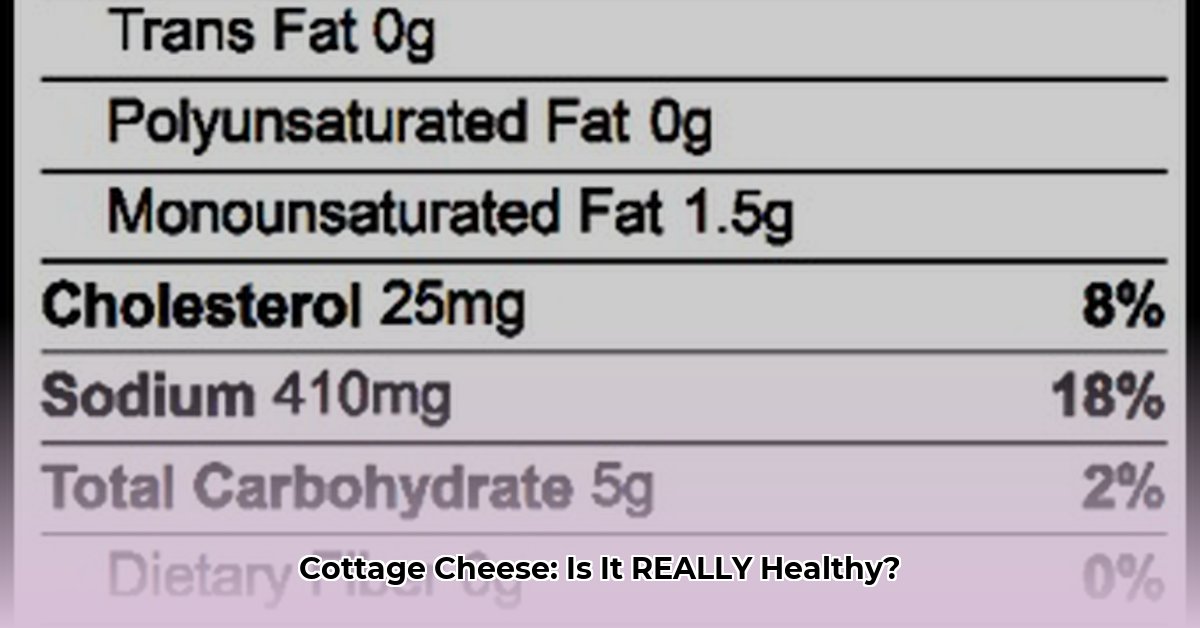Decoding the Dairy Aisle: Your Cottage Cheese Label Guide
Ever feel lost staring at the nutrition label on your cottage cheese? You’re not alone! This guide breaks down everything you need to know, from protein and fat to carbs and sodium. We’ll even compare different types and offer practical tips for incorporating cottage cheese into a healthy diet.
Cottage Cheese Nutrition Labels: A Visual Guide
(Insert high-quality, zoomable images of 2-3 different cottage cheese labels here: low-fat (1%), regular (4%), and a flavored variety. Ensure images are clear and easily readable on all devices.)
Nutrient Breakdown: What’s in Your Cottage Cheese?
Below each image or in a separate section, let’s break down the key nutrients. Remember, a typical serving size is ½ cup (113g), but always check the label to confirm.
- Protein: Cottage cheese is a protein powerhouse! A ½ cup serving typically provides around 12-14 grams, essential for building and repairing tissues, supporting your immune system, and promoting satiety. Research suggests that adequate protein intake may also help with weight management.
- Fat: Fat content varies significantly between cottage cheese types. Lower-fat versions (1% or 2%) contain less fat and fewer calories, while regular (4%) and full-fat varieties have a higher fat content, contributing to a richer flavor and texture. The fat in cottage cheese is primarily saturated fat. Some experts believe moderate saturated fat intake is acceptable, while others recommend limiting it.
- Carbohydrates: Cottage cheese is relatively low in carbs, typically containing 3-4 grams per serving, mostly from naturally occurring lactose (milk sugar). Flavored varieties often have added sugars, increasing the carb count.
- Sodium: Sodium content can vary significantly between brands. Opt for low-sodium versions or rinse your cottage cheese if you’re watching your sodium intake.
- Calcium: Cottage cheese is an excellent source of calcium, vital for strong bones and teeth. A ½ cup serving provides a significant portion of your daily calcium needs.
- Other Nutrients: Cottage cheese also contains smaller amounts of essential vitamins and minerals like vitamin B12, selenium, and phosphorus.
Cottage Cheese Comparison: A Quick Look
| Type | Serving Size | Calories | Protein (g) | Fat (g) | Carbs (g) | Sugar (g) | Sodium (mg) | Calcium (mg) |
|---|---|---|---|---|---|---|---|---|
| Low-Fat (1%) | ½ cup | ~80 | ~14 | ~1 | ~3 | ~3 | ~400 | ~80 |
| Regular (4%) | ½ cup | ~110 | ~12 | ~4 | ~3 | ~3 | ~450 | ~60 |
| Flavored (Peach) | ½ cup | ~100-120 | ~10-12 | ~2-5 | ~10-15 | ~10-15 | ~400-500 | ~50-70 |
Note: These are approximate values and may vary based on brand and specific product formulation.
Beyond the Label: Making the Right Choice
Several factors can influence the nutritional content of cottage cheese.
- Fat Percentage: Choosing a lower-fat cottage cheese reduces calories and saturated fat. However, some people prefer the taste and texture of higher-fat varieties.
- Flavorings: Flavored cottage cheese often contains added sugars, which can significantly increase the total carbohydrate and calorie content.
- Brands: There can be some variation in nutrition between brands, so always compare labels.
Serving Size and Sodium: Important Considerations
- Serving Size: Stick to the recommended serving size on the label. It’s easy to overeat cottage cheese, especially if you’re not using measuring cups.
- Sodium: If you’re sensitive to sodium, compare brands and choose low-sodium varieties. Rinsing can help reduce sodium but might also slightly decrease the content of water-soluble vitamins.
Conclusion: Empowering You to Make Informed Choices
The cottage cheese nutrition label is a powerful tool for making healthy dietary choices. Use this guide to understand the key nutrients, compare different types, and choose the best cottage cheese to fit your individual needs and preferences. While current nutritional information provides valuable insights, ongoing research continues to explore the complex relationship between diet and health, so staying informed is crucial. Remember, it’s always wise to consult with a healthcare professional like a registered dietitian or your doctor for advice tailored to your circumstances.
- Choosing the Best Meal Prep Lunch Box for Daily Use - February 17, 2026
- Sectioned Food Storage Containers Are Your New Meal Prep Lifesaver - February 16, 2026
- Divided Meal Prep Containers Make Organizing Healthy Meals Easy - February 15, 2026










